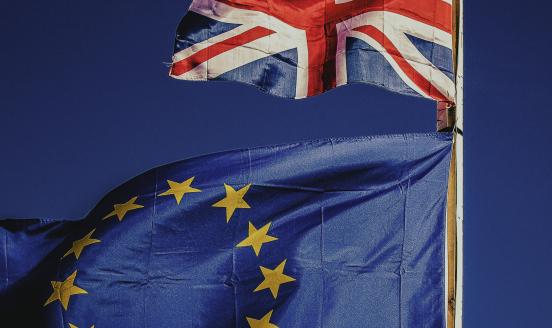Brexit and the law
What’s at stake: last week, the UK High Court ruled that the triggering of Article 50 - and therefore the Brexit process - should involve the UK Parli
Jo Murkens on the LSE blog has a very good explainer of the legal basis of the judgement, which he considers exemplary in its clarity and reasoning. The decision’s focus is strictly constitutional, not political: the only question it examined was whether, as a matter of UK constitutional law, the Crown, acting through the government, is entitled to use prerogative powers to trigger Article 50 in order to cease to be a member of the European Union. This - it turns out - hinges on a balance between constitutional requirements and individual rights.
Article 50 allows the UK to withdraw from the EU “in accordance with its own constitutional requirements”. Turning to these requirements, the government argued that the Crown - through the government - has a prerogative power to authorise the UK’s withdrawal from the EU, and that this power can only be taken away by express terms in an Act of Parliament. The court acknowledges the government’s position as correct, but only with respect to rights and obligations created as a matter of international law. As soon as individual rights protected by domestic law are affected, Parliament must be involved, especially because some individual rights would be lost upon withdrawal, as they cannot be replicated in UK law. Murkens argues that the decision amounts to a proper drubbing for the government particularly because it was not the claimants that landed the hammer blow, but the government itself, by acknowledging that the Art.50 notification would inevitably lead to the loss of some individual rights. The next stop, however, is the UK Supreme Court.
David Allen Green writes in the FT that the High Court decision is as strong as it could be and creates a substantial problem for the prime minister’s Brexit policy. The government should look hard at the reason for the court’s judgment. Central to the judges’ thinking is the impact that leaving the EU will have on the rights of UK citizens: the court has said that extinguishing such rights cannot be done by mere executive action. But the problem is more than one of form. The difficult and interlocking legal issues created by the UK leaving the EU are such that the matter is not for a prime minister, or indeed a court, to decide.
Allen Green argues that the government is not taking the opportunity offered by the judgment to start the exercise again, properly: an appeal has been announced and the court has been denounced. Those in favour of the UK remaining in the EU can draw only limited comfort from the decision, because there is no reason to believe parliament will directly defy the result of the referendum. The only thing that has been undermined by the High Court’s decision is May’s superficial approach to achieving Brexit. Eventually, the government will have to adopt a broader, more collaborative and more open approach to the process, as there is no alternative to making a success of it.
Camilla Macdonald discusses three options and argues that the ruling is not a victory for “soft” Brexit. The first option is for the government to succeed in overturning the result on appeal to the Supreme Court. MPs will then have the chance to debate at length, but they will have lost the leverage over the Government that the current ruling affords them. Second, the Government may lose the appeal and yet manage to “face down the rebels” in the Commons in time to meet May’s timetable of triggering Article 50 by March. This could be achieved by passing a non-amendable motion that presents MPs with a binary choice to approve or reject triggering article 50, assuming most MPs would not dare to risk the ire of the leave voting public. The third option - which Macdonald considers the most likely - is that the Government loses its appeal and is forced to introduce primary legislation, i.e. a Brexit bill, that will make it difficult, but not impossible, to meet the deadline. This is likely to force the Government to make concessions to MPs, but not necessarily in any form that will amount to a commitment to a “soft” Brexit.
“Soft Brexit” is what the majority of Labour, the Liberal Democrats, the SNP and part of Conservatives now want, but the biggest obstacle to this outcome is the lack of unity and of a negotiating strategy among this would-be coalition. In this situation, it is hard to see what red lines could be imposed on the government. Yet, Mcdonald thinks that involving Parliament in a process that will ultimately be defined by many complex and cross-cutting trade-offs might help to dispel the myths of simplistic “hard” and “soft” labelling. Nationalist parties would no longer plausibly be able to claim that they are excluded and the ruling could end up being an important victory for thought and reflection over rabble rousing on both sides.
Jolyon Maugham writes on FT Alphaville that after the High Court’s Brexit decision, we should forget about the activation of Article 50 in March. The Government’s appeal is likely to be heard in the Supreme Court in early December and this opens new risks. Lingering, unaddressed, in the background to this litigation is a question about whether an Article 50 notification is reversible. The High Court in reality proceeded on the assumption that a notification, once given, could not be withdrawn. But the Supreme Court has a different legal obligation and it might feel legally compelled to address that assumption directly. Addressing it would require a politically explosive referral to the European Court of Justice, because the question of whether a notification is reversible is one of European law. Beside the likely delay of around three months, a finding by the Supreme Court that an Article 50 notification could be “pulled” would leave ajar the door to a prospectively damaging continuation of the Referendum campaign until the time exit is formalised.
Assuming instead that the appeal fails, the government will have to draft a Bill and place it before parliament. And that Bill would have to pass both Houses of parliament. In the Commons there would be little or no enthusiasm for rejecting it, but it is likely that MPs would impose conditions on the triggering of Article 50, thus constraining the government’s negotiating position. Parliament may wish to choose whether to accept the outcome of the negotiations and it may even require that the deal negotiated by the government be put back to the people in the form of a second referendum. In practical terms, it is difficult to contemplate that these steps – drafting a Bill, debating it in the Commons, voting on amendments, placing it before the House of Lords and then addressing amendments introduced by the Upper Chamber in the Commons again – can sensibly be taken after the result of the Supreme Court appeal is known but before March. So, unless the Supreme Court overturns the High Court’s decision, Maugham thinks we should consider May’s March deadline ancient history.
Stephen Booth at Open Europe makes four main points about what this decision means going forward. First, if Government loses the appeal, then legislation is likely to be necessary. The reasoning of the ruling illustrates that, if the claimants’ argument holds (which regards rights stemming from EU membership set down in parliamentary legislation), the courts were never likely to be satisfied by anything short of legislation to trigger Article 50. Second, parliamentary moves to block Article 50 trigger would be politically explosive. It is unlikely that a majority of MPs in the Commons would actually move to block Brexit by preventing the Government triggering Article 50, especially having voted to give the public the opportunity to vote to leave the EU in the referendum. Booth argues that the same is probably true for the House of Lords, which would create a full-blown constitutional crisis if it opposed Article 50 outright.
Third, Parliament’s leverage over process is far greater than over any negotiating mandate or outcome. So process is likely to be the focus of any parliamentary tussles over legislation to trigger Article 50, with MPs and Lords seeking to amend the Bill to give them greater and more formal powers to scrutinise. Fourth, Booth argues that a general election is not out of the question. This would certainly mean missing the end of March 2017 deadline but would also mean that any MPs seen to be blocking the referendum result would find it very hard to keep hold of their seats and this is why he thinks it is likely that an Article 50 Bill would be passed.
Jacob Funk Kirkegaard of the Peterson Institute for International Economics argues that for now, this turn of events exposes the hypocrisy of May’s government position of wanting to repatriate all EU political powers back to the United Kingdom, but wishing to deny the country’s sovereign lawmakers a say on the Article 50 process. Whatever happens, the court ruling has dealt a blow to the small right-wing clique of hardcore euro skeptics in the Conservative Party and May’s government and the potential direct involvement of Parliament is good political news for Jeremy Corbyn, leader of the Labour Party - as his only path to becoming prime minister is the one that opens up if May and the Conservatives completely botch the Brexit negotiations. He also argues that this should also harden further the EU negotiating position. These developments make it more likely that May will soon be forced to call an early election to seek a new mandate on Brexit. The Conservatives would probably win, but an accelerating economic downturn, the United Kingdom’s first past-the-post-electoral system, and a potential rallying of Remain supporters, could spring a surprise.
Tyler Cowen argues that the British parliamentary vote might matter. The more likely scenario in his view is simply that Parliament stalls, demanding that Theresa May give them “the right Brexit”. Of course there is no such thing, wrong Brexit is wrong Brexit, if only because EU-27 cannot agree on very much. But with enough stalling, eventually another national election will be held and of course Brexit would be a major issue, probably the major issue. That in essence would serve as a second referendum, and if anti-Brexit candidates did well enough, parliamentarians would have cover to go against the previous expression of the public will.



